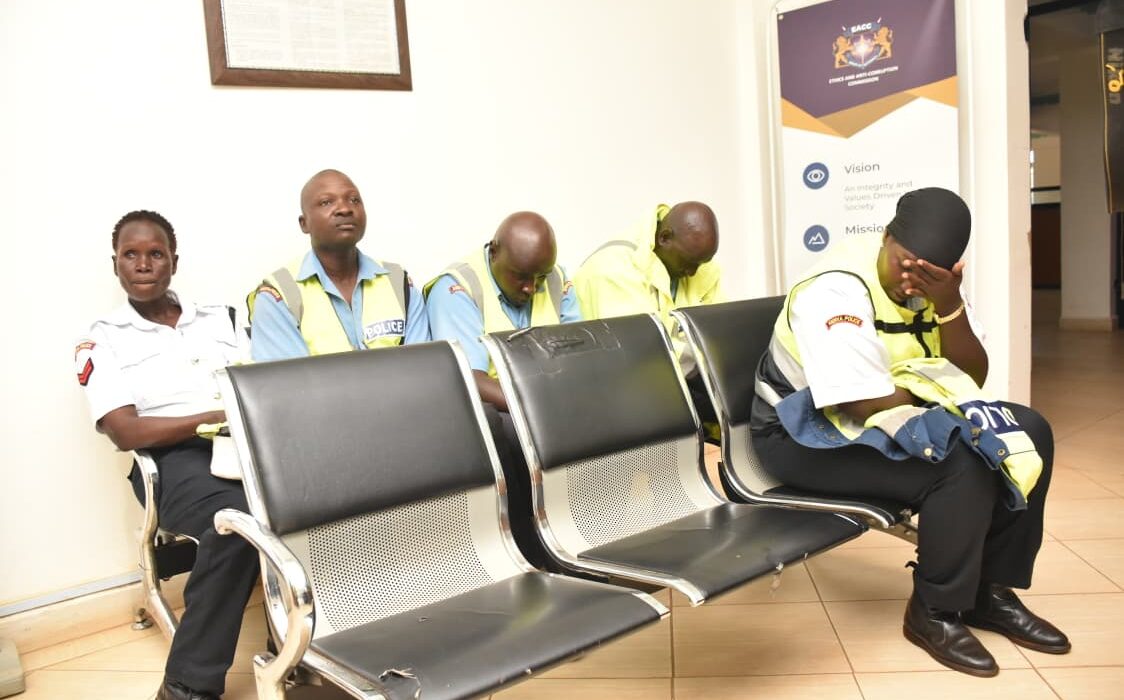The Ethics and Anti-Corruption Commission (EACC) has arrested five traffic police officers attached to Busia Police Station for allegedly demanding and receiving bribes from motorists along the Kisumu–Busia highway, marking the latest in a series of anti-corruption crackdowns targeting law enforcement officers on Kenya’s roads.
According to the EACC, the arrests were made following a surveillance operation conducted along the busy route about five kilometres from Busia Town. The officers are accused of extorting money from drivers of private and commercial vehicles without conducting any formal vehicle inspections or enforcing traffic regulations.
The arrested officers have been identified as Corporal Hezron Aburi, Corporal Mary Nabei, Police Constable James Weru, Police Constable Mwakwekwe Nyoka, and Police Constable Aisha Abdullahi. They were taken to the EACC Western Regional Office in Bungoma for questioning before being booked at Bungoma Police Station for further processing.
EACC said the sting operation followed numerous complaints from motorists and members of the public alleging routine harassment and bribery demands at the roadblock. In a statement, the Commission noted that motorists had reported being forced to pay small cash bribes — often ranging between KSh100 and KSh500 — to pass through the checkpoint, regardless of compliance with traffic laws.
“The Commission received multiple reports from road users concerning persistent extortion at the Kisumu–Busia highway roadblock, prompting an immediate investigation,” said the EACC in a statement. “During the operation, officers were found soliciting and receiving bribes from motorists entering or leaving Busia Town without carrying out any lawful enforcement duties.”
Part of Broader Crackdown
The arrests form part of an ongoing nationwide campaign by the EACC to dismantle bribery networks at public service delivery points, including police roadblocks, border posts, county offices, and licensing centres.
EACC spokesperson Eric Ngumbi confirmed that the agency is scaling up intelligence-driven operations across high-risk sectors where bribery and extortion have become systemic.
“This operation in Busia is part of a broader effort to restore integrity within public service institutions and improve the experience of citizens who depend on these essential services,” said Mr Ngumbi. “The Commission will continue to take decisive enforcement action against any public officers found engaging in corruption or abuse of office.”
He added that EACC is working closely with the National Police Service (NPS) and the Office of the Director of Public Prosecutions (ODPP) to ensure that implicated officers face disciplinary and criminal proceedings.
“The Commission will not relent in holding public officers accountable for corruption-related offences. We are coordinating with relevant agencies to ensure the suspects are prosecuted and deterrent measures are enforced,” he said.
Persistent Bribery in Traffic Enforcement
Bribery involving traffic police officers remains one of the most frequently reported forms of petty corruption in Kenya. Studies by Transparency International Kenya and the EACC have consistently ranked road traffic enforcement among the top areas where citizens experience extortion and harassment.
The Kisumu–Busia highway, a key transit corridor linking Kenya to Uganda, is particularly prone to corruption incidents due to heavy cross-border trade and commercial transport traffic. Truck drivers and public service vehicle operators often complain of routine bribe demands at multiple roadblocks between Kisumu, Busia, and Malaba.
In its 2023 National Ethics and Corruption Survey, the EACC identified the National Police Service as the public institution with the highest number of bribery complaints, accounting for over 30% of reported incidents. Roadblocks, weighbridges, and licensing offices were among the most cited locations for corruption encounters.
The report also noted that bribery by motorists and traffic officers perpetuates a cycle that undermines road safety enforcement and contributes to poor compliance with transport regulations.
“Corruption at roadblocks erodes public confidence in law enforcement and creates an environment where safety standards are compromised,” said a governance analyst based in Nairobi. “EACC’s renewed action in this space sends a strong signal that the era of impunity is coming to an end.”
Legal and Institutional Action
The five arrested officers are expected to face charges under the Bribery Act, 2016, which criminalizes both the solicitation and acceptance of bribes by public officers. If convicted, they could face fines or imprisonment of up to ten years, depending on the severity of the offence.
EACC has urged members of the public to continue reporting incidents of corruption through its toll-free hotline and regional offices. The Commission emphasized that successful prosecutions depend on timely and credible public reporting.
In recent months, the EACC has intensified on-the-ground operations across Western, Rift Valley, and Coast regions, with multiple arrests made in similar sting actions. In August 2025, three police officers in Uasin Gishu were arrested for allegedly extorting money from motorists on the Eldoret–Nakuru highway. Earlier in the year, the agency also apprehended customs and immigration officers at the Malaba and Lungalunga border posts for soliciting bribes from traders and travelers.
“These arrests demonstrate our commitment to curbing bribery in all its forms,” said Mr Ngumbi. “The Commission will continue to act on intelligence and collaborate with stakeholders to ensure accountability in law enforcement.”
Building Public Trust
Analysts say sustained anti-corruption enforcement is critical for rebuilding public trust in the National Police Service, an institution that has faced reputational challenges due to widespread bribery and abuse of office allegations.
EACC officials argue that addressing such practices not only improves service delivery but also enhances Kenya’s overall investment and governance environment.
“Integrity in frontline public service, especially in the transport and trade sectors, has a direct bearing on the economy,” said an EACC regional officer. “By eliminating bribery at the roads and border points, we reduce costs for traders, improve compliance, and boost Kenya’s competitiveness.”
The Commission reiterated that it will continue using both intelligence-led investigations and citizen partnerships to detect and deter corruption. Motorists are encouraged to refuse to pay bribes and instead report extortion attempts to the EACC through its hotline, email, or regional offices.
As the five officers await prosecution, the operation along the Kisumu–Busia highway serves as another reminder that Kenya’s anti-corruption watchdog is intensifying efforts to hold public officials accountable and restore integrity in service delivery.





